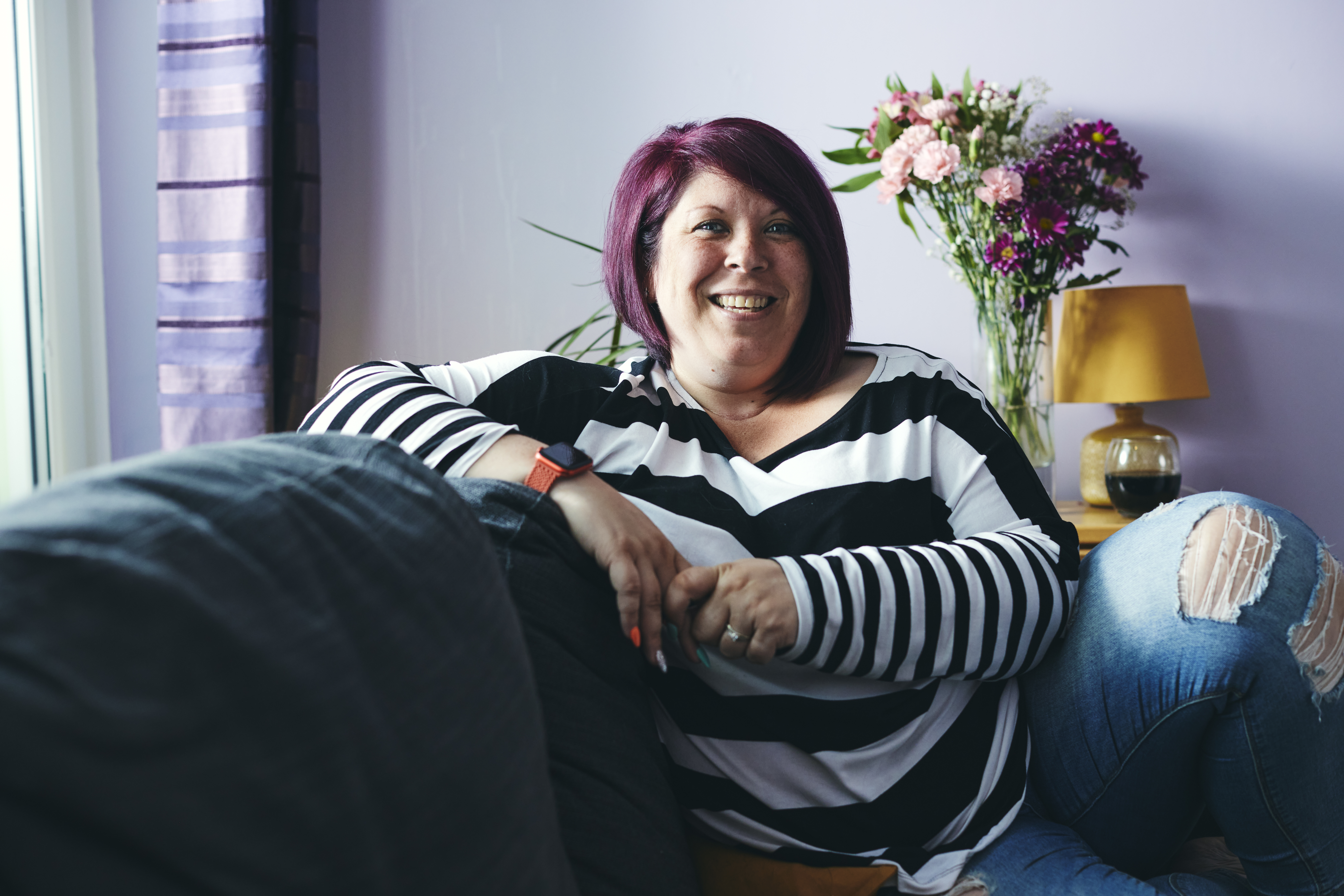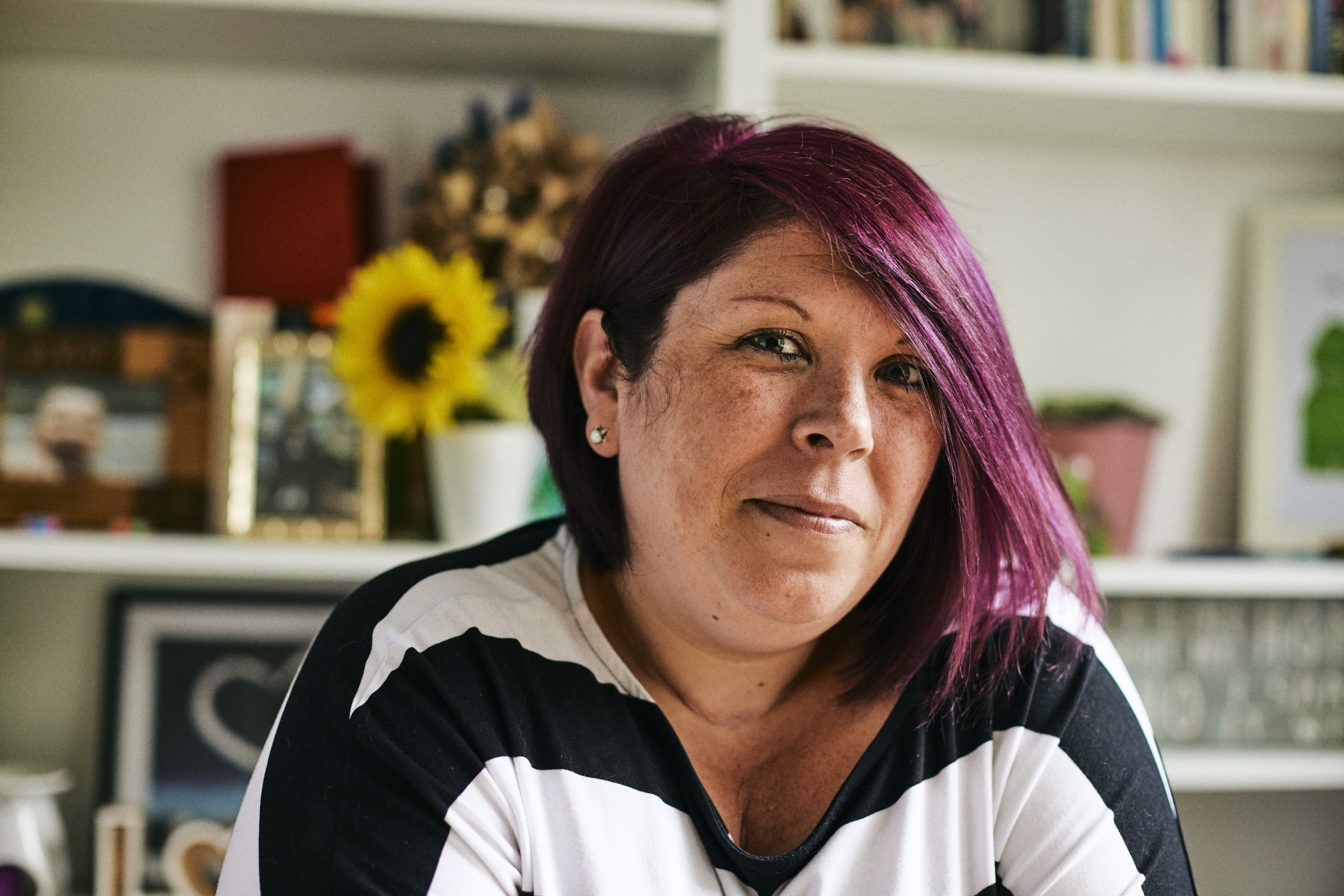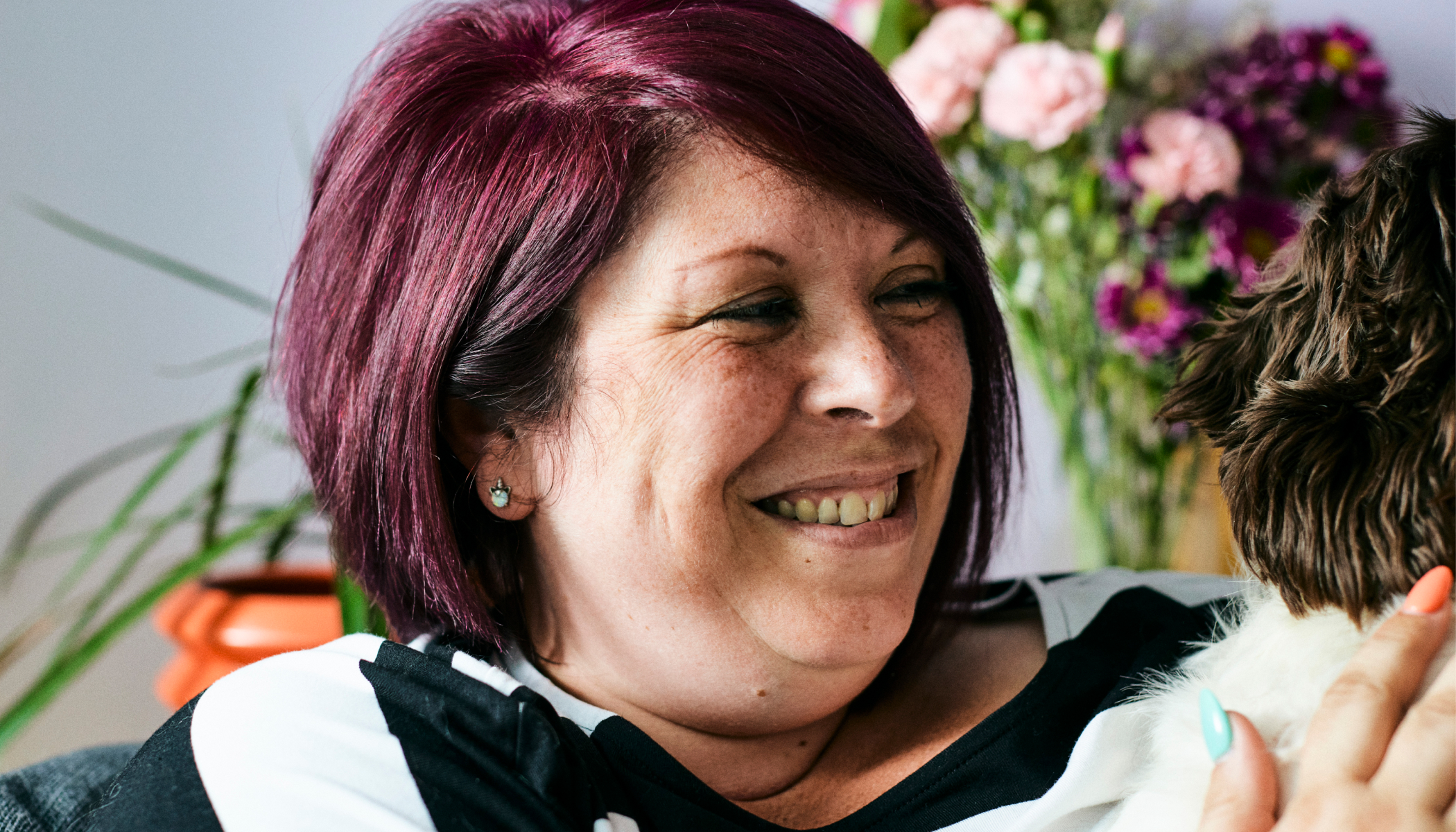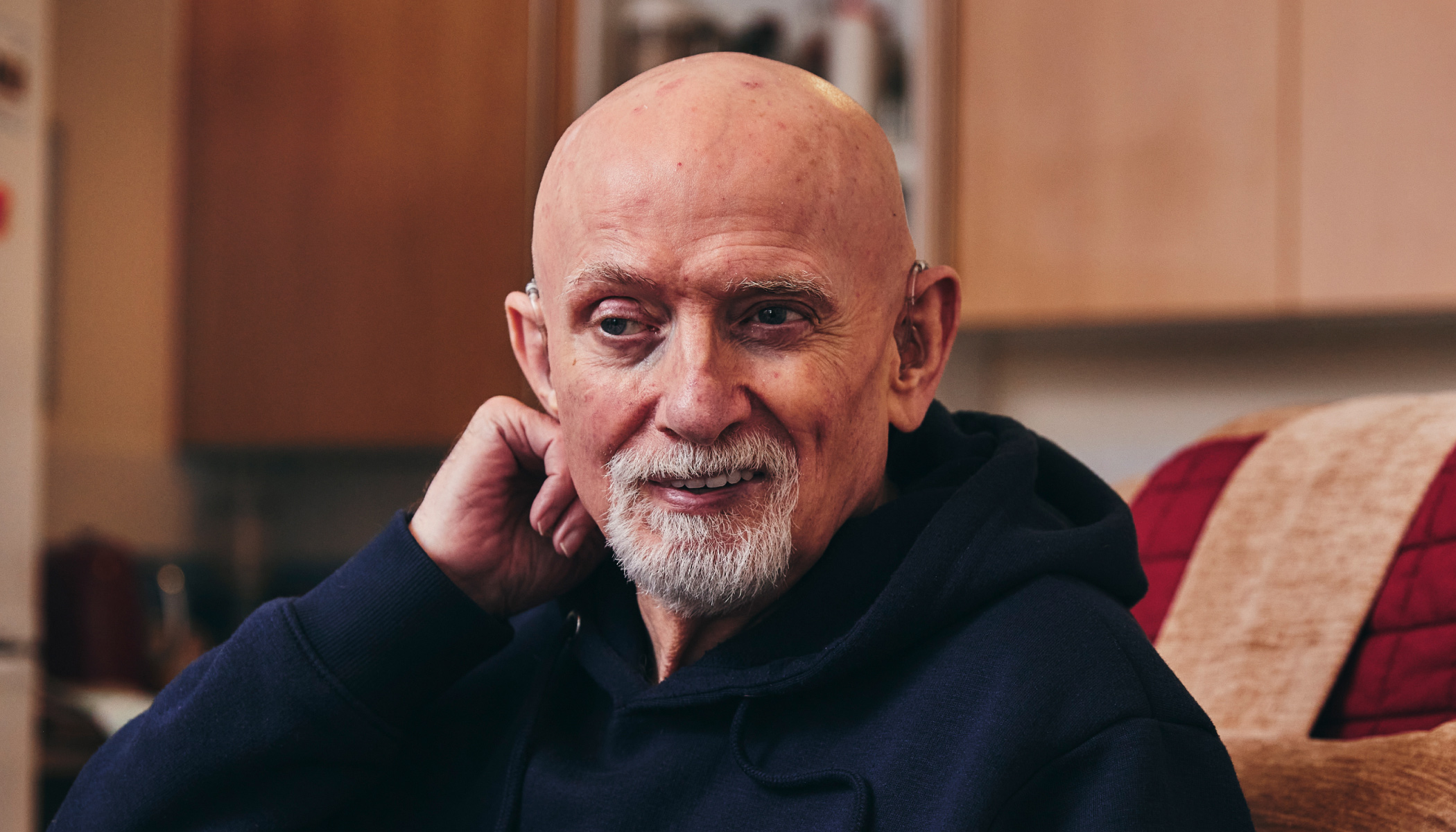"To say life has been a rollercoaster over the last 8 years would be an understatement.
In September 2014 I noticed a lump on my neck. A doctor told me to get it checked with my GP, which I did when I noticed the lump had grown. A few weeks later, having just got engaged, I was told I had a tumour in my thyroid. The biopsy that was done at the ultrasound was inconclusive, so the news wasn’t good or bad, just unknown as to whether it was benign or malignant.
I had surgery to remove the tumour on the 26th March 2015. What should have been no more than a 2-and-a-half-hour surgery ended up taking over 5 hours because the tumour had grown out of my thyroid and around the nerves of my left vocal cord. I remember waking up in recovery at 10:30pm when I expected it to be 6pm, feeling terrified that something had gone wrong. The next day when I was discharged, I was told the results would be back within 2 weeks and that my voice was just hoarse from the operation.
10 days later, I went to my GP surgery to have my stitches removed. What I hadn’t anticipated was that there was just a single stitch, which went from end to end of the incision right across my neck. As the nurse removed it, I felt the entire thread pull through the inside of my neck, and suddenly I felt like I’d had my throat slit. To this day I still can’t have anyone touch my neck. It freaks me out. Even seeing a throat-slitting on TV is too much for me, so that was the end of my interest in The Walking Dead.

Sadly, my voice didn’t return. Further tests showed that my left vocal cord was paralysed from the operation. This was particularly devastating as I was on the senior leadership team at work, usually giving frequent presentations and hosting meetings. When no one could hear me, it massively knocked my confidence. It felt like all my authority had been taken away.
My entire social life had been built around going to gigs, performing as a singer, eating out and having drinks at the pub. Suddenly I couldn’t sing, nor could people hear me over the typical hum of a pub or restaurant table. I began to stress about socialising to the point where I just didn’t go out. I became completely isolated from my friends, and work was different too.
On my 34th birthday at 12:15pm, 3 weeks after the operation, I got the phone call to tell me the tumour was benign. If I could have cried and screamed at the top of my lungs at the same time, the whole world would’ve heard. Instead, I had a little silent boogie and amazingly felt like celebrating my birthday.
About a month after the surgery I began feeling the symptoms of an underactive thyroid. I was put on levothyroxine and saw a rheumatologist, and the dosage was fiddled with until we found the right balance.
Aside from the expected exhaustion and weight-gain, I began experiencing what, at the time, I called my ‘thyroid legs’. It was the most horrible pain I’d ever experienced. A constant gnawing ache that would get really bad from time to time. I also started getting pins and needles in my feet which felt like I was walking on broken glass.
I was told the pain was down to a vitamin D deficiency, so I was put on a high dose of prescription tablets to rebalance my levels. The pains and pins and needles never went away, but as I was getting married that October and had already ordered my wedding dress, I had some post-op underactive thyroid weight to lose. So, I accepted what I was told, and I focused on losing the weight and rebuilding the me that was lost to this tumour.
I got up at 5:45am every other day and went for a 7km run. On Saturdays I’d do 13km. Pre-tumour I had just 25% body fat and was at my healthiest, so this didn’t seem difficult to do. But these runs would ruin me, and the only thing that would make me feel better was a super hot bath as soon as I got home. I ended up having my wedding dress taken out a bit, though it still mostly fit which was a relief.
A few months later I had a huge win. I laughed on my drive to work. I hadn’t made that sound in a while and I was so petrified of it going away that I tried to keep silent for the entire day at work. Later on I walked straight into the music room in our house, picked up my guitar and played the song I wrote for my husband. To start with, Adam just stood in the doorway thinking I’d lost the plot, but when I opened my mouth and sang, tears spontaneously poured out of both our eyes as we realised my miracle had happened.

The next few months were a blur. Adam and I got married in October, spent our honeymoon money on a piano to have more musical moments and instead went on a mini-moon to Prague. Then in August of 2016, I was pregnant.
The pregnancy was difficult right from the start. I’d been diagnosed with polycystic ovary syndrome when I was 16, told I’d never have kids at 18 and here I was, pregnant but in so much pain. The pains all over my body got so much worse than before, the pins and needles unbearable, the exhaustion constant. It was horrid.
I was told the pins and needles were carpal tunnel syndrome, and that my weight put me at risk of gestational diabetes. I had 4 glucose tolerance tests during my pregnancy because each time, the doctors didn’t understand the results. I was again told that the pains were my thyroid and vitamin D deficiency, and the pregnancy was just taking its toll on me. I just focused on the end goal – a baby I’d never imagined I’d have.
I began to get feedback from colleagues about how I was coming across as short, even patronising. Apparently the way I talked had changed and slowed down, like I was talking to people as though they were stupid. I was even put on a course to understand that different people have different communication styles, to try and stop me from getting so impatient with people who just annoyed me. I was a bit taken back by this. I’d noticed I was more frustrated, but it felt like my brain just couldn't get the words out properly. It had nothing to do with me wanting to patronise people, but that’s how it was coming across. I blamed baby-brain and just got on with it.
My daughter Chloe was born in March 2017. The labour started out brilliantly, but soon turned into a 72-hour marathon that ended with an epidural, and on the verge of an emergency C-section. Chloe and I were both poorly afterwards and spent 7 days in hospital, so we didn’t have a great start. And it only got worse.
Chloe had a cow’s milk protein allergy along with severe reflux and silent reflux and she was, quite rightly, a very cranky baby. It really took its toll. The reflux made it too painful for her to lie flat, and every feed hurt her so each bottle took an hour. She had to be kept upright for 30 minutes after a feed and a lot of the time, it would all come back up and I’d have to start over again.
I remember sitting in a baby massage class having just given Chloe a feed. She literally threw the entire bottle back up – it collected into a puddle in my lap. I burst into tears and after that, I just couldn’t bring myself to go out again as it meant packing multiple bottles, changes of clothes for her and me, her meds… it was just too much. So once again, I isolated myself from the outside world.
2 months later on the 16th August, my husband had a head-on car crash with a driver who had a stroke behind the wheel while they were both doing 50mph. Looking at the photos, it’s incredible how Adam made it out of the wreckage with just whiplash and back issues. We lost his income overnight as he was self-employed and couldn’t work for 5 months and we had a 4-month-old daughter and bills to pay. On the 18th August 2017, I had a breakdown.
I was diagnosed with severe depression and anxiety. I initially put this down to having had a rough 4 months with Chloe but as I settled onto antidepressants and talked more to my GP, I realised I’d been living with depression since 2015 when I was looking at life with a tumour in my thyroid. All of a sudden the feedback from my colleagues and my anger at the smallest things all made sense. But at the time, I had no idea something was wrong.
It’s ironic because I earned my mental health first aid qualification in 2016. So there I was at work, with depression, helping other people at the point of breakdown, completely oblivious to my own worsening headspace. I helped a friend of mine who tried to commit suicide and I helped others through panic attacks, so my awareness is usually there and I can spot the symptoms from a mile off in others. But I didn’t see it for myself.
As a way to help we decided to get a puppy, who we called Strudel. It was a way for me to get out again – I had to go and walk her, I had to be in a public place and cope with life and Chloe’s medical problems. Otherwise, I would’ve just stayed at home and let myself spiral. People always talk about how weighted blankets help comfort them, and I find my dogs have the same effect. When I’m having a really bad time or I’m in pain, I’ll lie on the sofa and Strudel lies on top of me. It’s so comforting.

A year later, I was back at my doctor’s to have more blood tests. Everything came back normal – my vitamin D, my thyroid levels – there was nothing more to put my symptoms down to. So, the following day I went back to my GP with a list of my symptoms alongside all the things they’d diagnosed me with over the years, like carpal tunnel, vitamin D deficiency and the underactive thyroid.
I recited the list to my GP who asked, ‘What do you think you have?’ I replied, ‘I think I have fibromyalgia’ and she told me she agreed. I felt like finally, it made sense and someone out there believed me. It took 3 years to get there.
Most people don’t recognise how hard it is to get a fibromyalgia diagnosis because there’s no test you can do, it’s more a process of elimination. Just like with my depression and anxiety, the symptoms started when I had the thyroid tumour.
They say fibro is a trauma response and it’s caused by a chemical switch. The receptors in my brain are telling me I have pain but I don’t. Every day it’s difficult, but a flare-up is unbearable. It’s pain that stops me in my tracks.
The doctor put me on pregabalin which is used for epilepsy, but it helps with fibro too as it blocks the pain receptors from sending signals to say something hurts. It also stops new synapses from being formed in the brain, which in the long term can be an issue for memory.
When I was first getting used to it I felt like I was stoned, which was really strange on work calls! One of the side effects is weight gain, and I ended up putting on a stone and a half in 8 months. I was already battling with my thyroid problems and not exercising because of my pain, so I had to come off the pregabalin. I was gutted because it did help. After that I was on amitriptyline which is an antidepressant that’s also used to treat fibro.
I used to get quite bad brain fog which made me forget to order my repeat prescriptions – quite a lot! It would get to a Friday night and I'd panic that I didn’t have meds for the weekend. So I used Livi to have a video call with a GP, called Dr Davidson, and she was honestly the nicest person. Nicer than my own GP. I explained I needed my medication and she said, ‘Yeah that’s fine, but let’s talk.’ Instead of just writing me the prescription, she took the time to find out if my meds were actually working and if I was still happy taking them. She also asked how my mental health was and what I did to manage it.
We talked about the fibro quite a bit. It turned out in the past she’d done her own research on the condition, and she recommended a food plan called the Whole 30 which suggests foods to cut out, depending on your condition, to reduce inflammatory responses. It’s really interesting. I need to cut out gluten, dairy, red meat and other things but it’s hard with a 5-year-old because all she wants is beige food! So instead I’ve taken some of the principles on what foods to eat more of and focus my diet there.
What’s made the biggest difference is taking more supplements, like turmeric, magnesium and a few others. The Livi GP recommended supplements that help and she even linked me to a specific one for fibro that contains lots of helpful minerals. It definitely has an impact – when I remember to take it!
I stopped taking all pharmaceutical meds for my fibro back in February 2022, because I was sick of the side effects like weight gain as I put another stone and a half on with the amitriptyline, and the supplements helped me enough. Especially for the brain fog – I actually felt present again for the first time in 5 years. But by May, I was thinking more about not living anymore than I was anything else and I knew I had to talk to a doctor to see if there was another pharmaceutical drug that could help me with the fibro pains.
It took me 3 weeks to get through to my GP, who told me I had to just lose weight, get some sleep and exercise to ‘cure’ my fibro. I asked to talk to someone else and was put through to the clinical pharmacist at the GP practice, who spewed the same line out that the GP had a week earlier. I could feel my anger bubbling up and then just exploded with “I’d love to be able to exercise, and I’d really love to be able to sleep (insomnia is a symptom of fibro), but right now I just want to kill myself and I’m asking for help, so is that really all you can do for me? Tell me some scripted response with zero understanding of what living with Fibro is like?”
I think the pharmacist was quite shocked by my outburst, but she apologised for sounding like she didn’t care, or understand and prescribed me Duloxetine. I’ve been on Duloxetine for 2 months and I am now pain free 90% of the time. I literally cry with joy every day when I realise I don’t hurt. What’s best is I’ve started walking the dogs more, I’ve started running again and am even using my bike instead of the car to get places. I’m running around the house, chasing my daughter in games. I’m not the boring mum who always needs to be sitting down anymore. I’ve dropped 9lbs and 1 to 2 dress sizes. It’s incredible and I am loving life and I really hope it continues like this.
I’m still taking my supplements and when I have a flare up, it’s manageable enough with adding in some leg massages and CBD oil. I’m really lucky that I have a fully remote job as it’s perfect for me to manage the pain because it means I can sit with my heat pad while I work, and have a bath whenever I need as the heat really helps me.
My fibromyalgia will never go but it’s mostly managed. If I wanted to, I could apply to get my blue badge because it’s a registered disability, but I really don’t want to get there. I consider myself lucky because I can still operate. Sometimes I don’t know how because it’s bloody tough, and I’ve had a couple of moments where I just think, ‘I’m done, I don’t want to live like this.’ Especially with the depression on top, it can send me to a really bad place.
But I just carry on. My husband and best friend know how to humour me and make it lighthearted, and that gets me through. When I’m having a really bad flare-up, I say, ‘Right, get the meat cleaver, a limb is coming off!’ And they reply with things like, ‘Don’t forget to put the shower curtain on the floor so it doesn’t make a mess!’ I’m super grateful for the friends who have stuck by me and my family. Without them, I wouldn’t be here.”
Dr. Davidson kind of restored my faith in doctors. I came off the call with her absolutely buzzing because I had someone who took the time to talk to me, was interested and knew what she was talking about. Then 5 minutes later I got a message from her directly through the app with links to all her research and things that can help. It was exactly what I needed from a doctor. I’d love to be able to tell her, ‘Thank you, you rock!’


